In this project update blog post, read about OceanStates’ participation in the One Ocean Week with partners from the University of the South Pacific who visited us in Bergen last month.
Written by Håkon Larsen
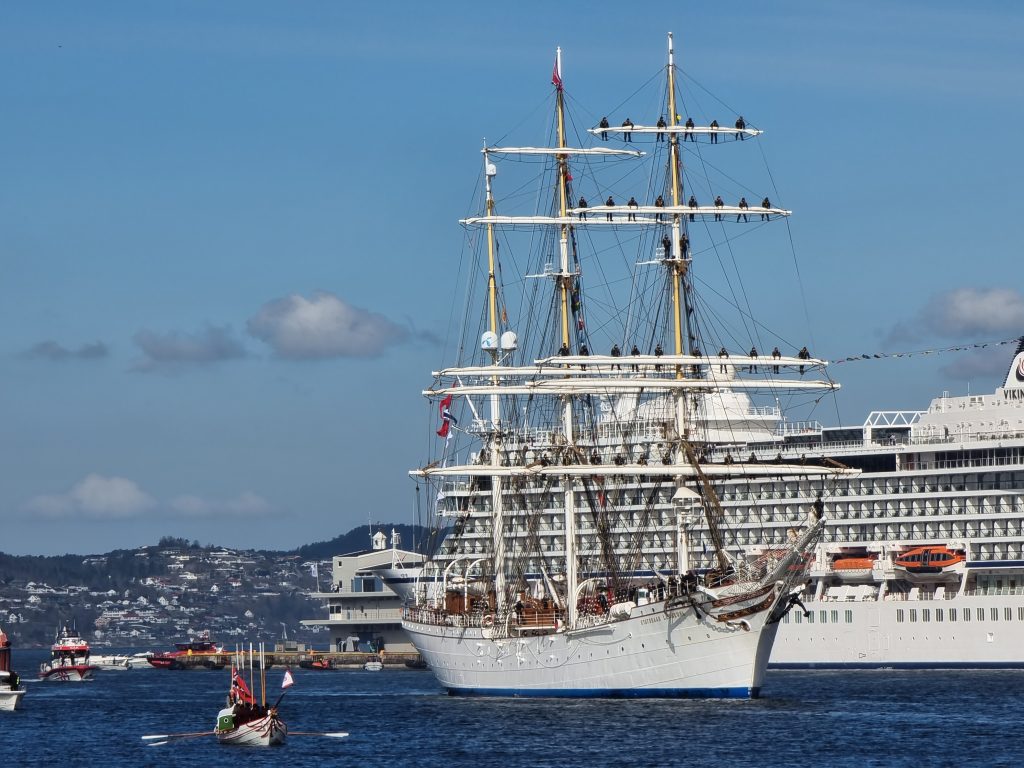
Statsraad Lehmkuhl arriving back to Bergen and completing its circumnavigation and One Ocean Expedition, 15. April 2023. Photo: Håkon Larsen.
Last month, the OceanStates project was fortunate to host a diverse delegation of students and staff from the University of the South Pacific (USP) here in Bergen to partake in the One Ocean Week (15. – 21. April), marking the return and completion of the Bergen tall ship Statsraad Lehmkuhl’s 20-month circumnavigation and One Ocean Expedition. For a duration of about two weeks, the USP invitees were key actors in events coordinated by the University of Bergen (UiB) and by OceanStates, with a particular focus on disseminating the value of ocean and climate perspectives from the Pacific into public discourse.

From Fiji and USP, the invited delegation was made up of seven close partners of our Bergen team in terms of both the OceanStates and N-POC projects: Sushil Kumar (Director of the Research Office at USP), Lillian Fuata (Manager of International Office at USP), Larry Thomas (Director of the Oceania Centre at USP), Milla Vaha (Senior Lecturer in politics and international affairs at USP and affiliated researcher with OceanStates), Bernadette Tunidau (USP student), Ozayr Akbar (USP student) and Benjamin Wheeler (filmmaker and collaborator with OceanStates).
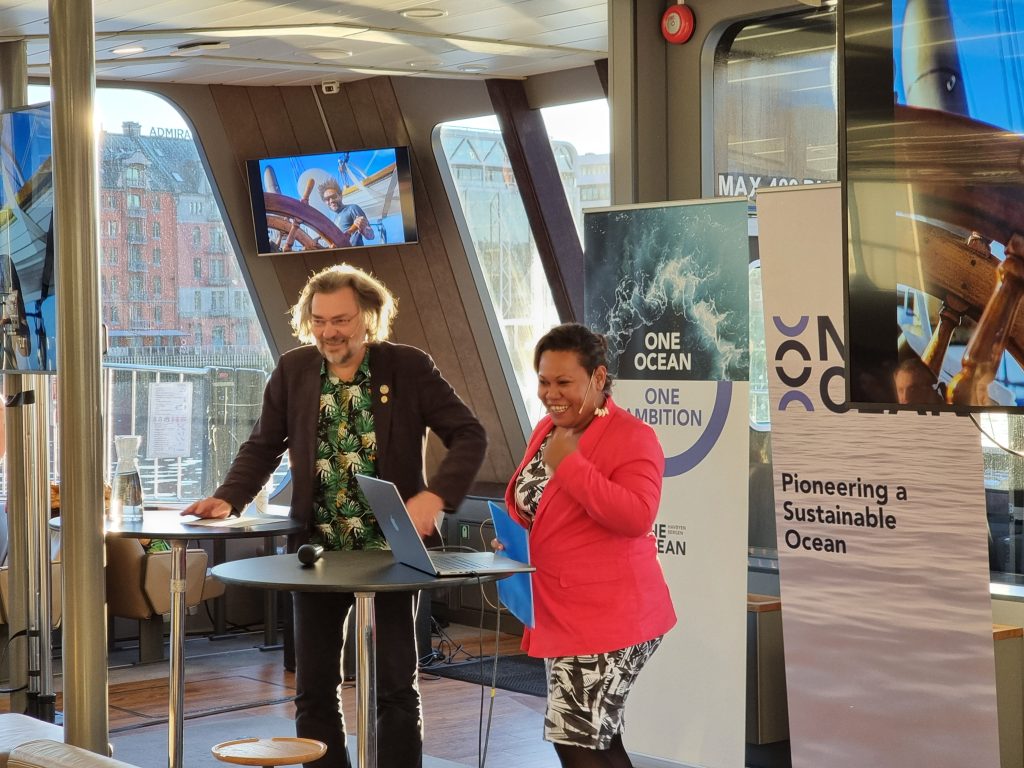
Edvard Hviding and Lillian Fuata in conversation during the Ocean Talanoa event. Photo: Håkon Larsen.
For the OceanStates project, the main event of One Ocean Week was Ocean Talanoa, hosted onboard the electric catamaran Vision of the Fjords in the harbor of Bergen, where we brought a good-sized audience together to discuss the critical value of cross-cultural dialogue in multidisciplinary approaches to ocean, climate and sustainability. The event was primarily focused on the experiences of young students, represented by Ozayr Akbar and Bernadette Tunidau from Fiji and Vilde Helene Takla and Andreas Octavio Navarro Nes from Norway. In a lively panel moderated by Milla Vaha, the students made reflections on their joint participation in the a three-week voyage and active teaching experiment in Fiji waters last year, as part of One Ocean Expedition, where the Fijian storytelling practice talanoa was used to work on contemporary and multidisciplinary issues of ocean and climate science, politics, sustainability and diplomacy (read more about the Ocean Talanoa experiment in this previous blog post).
The Ocean Talanoa event also included the premiere screening of a documentary film produced by Benjamin Wheeler that was shot onboard Statsraad Lehmkuhl during this voyage, as well as a dialogue between Edvard Hviding and Lillian Fuata which highlighted the importance of the long-standing USP-UiB partnership and collaboration in higher education and research.
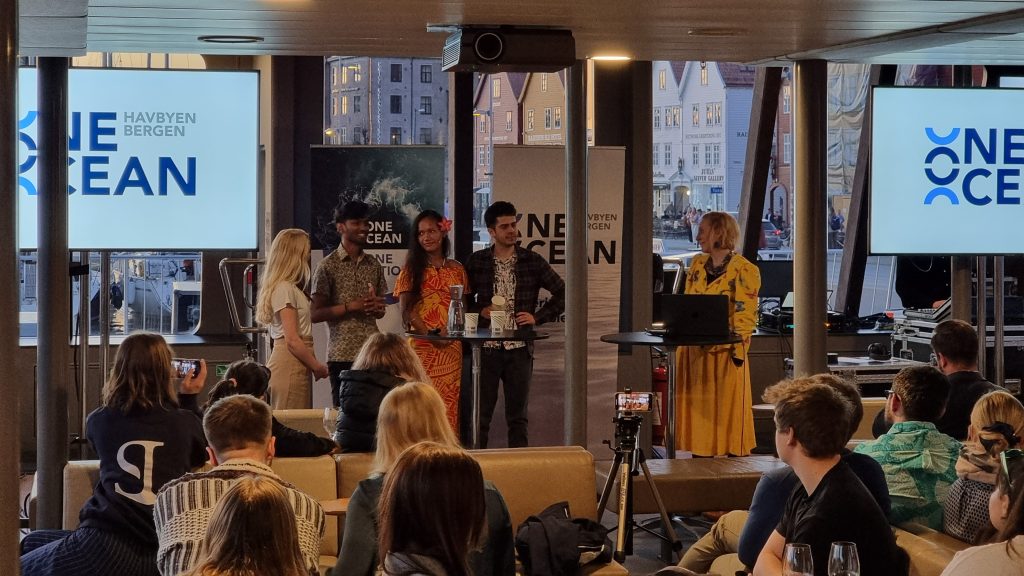
Ocean Talanoa panel discussion with Vilde Helene Takla (left), Ozayr Akbar, Bernadette Tunidau, Andreas Octavio Navarro Nes and Milla Vaha. Photo: Håkon Larsen.

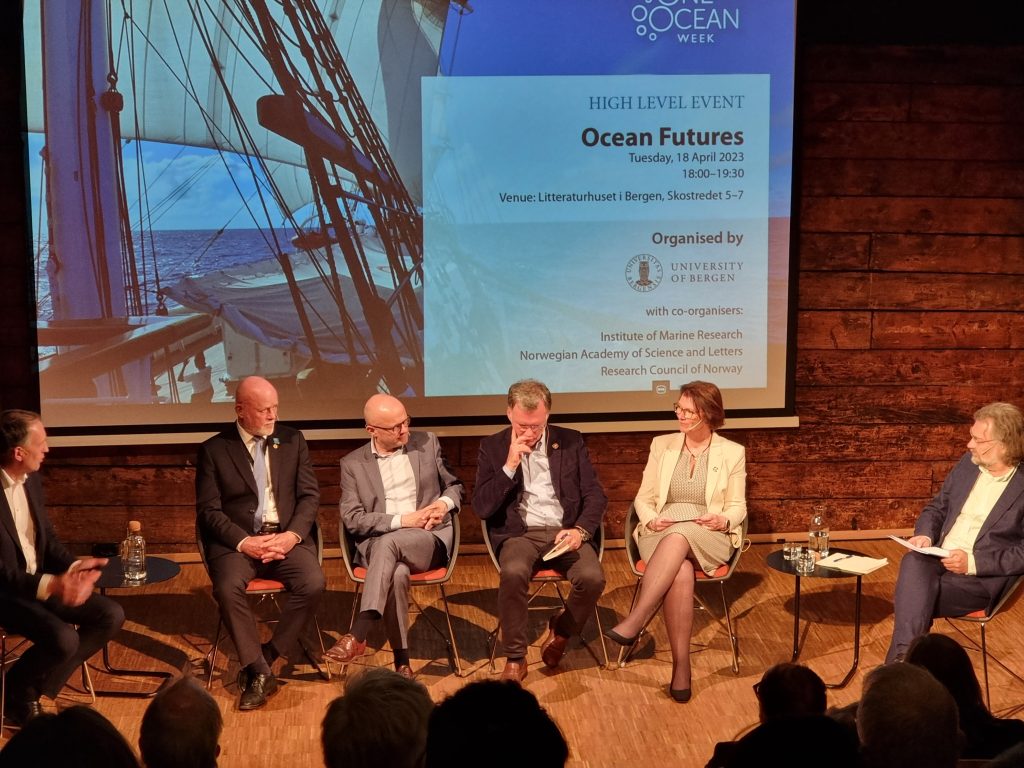
Ocean Futures panel with Peter Haugan (left), Peter Thomson, Vidar Helgesen, Henrik Harbore, Lise Øvreås and Edvard Hviding. Photo: Håkon Larsen.
Our OceanStates team and USP delegation were also active participants in several other events throughout the One Ocean Week. Edvard Hviding co-moderated the high-level Ocean Futures panel where the UN Convention on Biological Diversity (CBD) and the Biodiversity Beyond National Jurisdiction (BBNJ) negotiations were discussed amongst diplomats (including UNSG’s Special Envoy for the Ocean, Peter Thomson), policy makers and scientists, reflecting on the implementation and broader implications of legal instruments for the high seas, particularly in terms of the contested fields of marine genetic resources and deep-sea mining. Later at the same venue, Bernadette Tunidau and Ozayr Akbar partook in another youth-focused event, organized by the UiB project Climate Narratives, alongside students and researchers from Jamaica and Canada, to discuss local impacts of global climate change: an event which attracted such an enormous audience that spectators had to stand outside in the hallway or sit on the floor to be able to view the event.
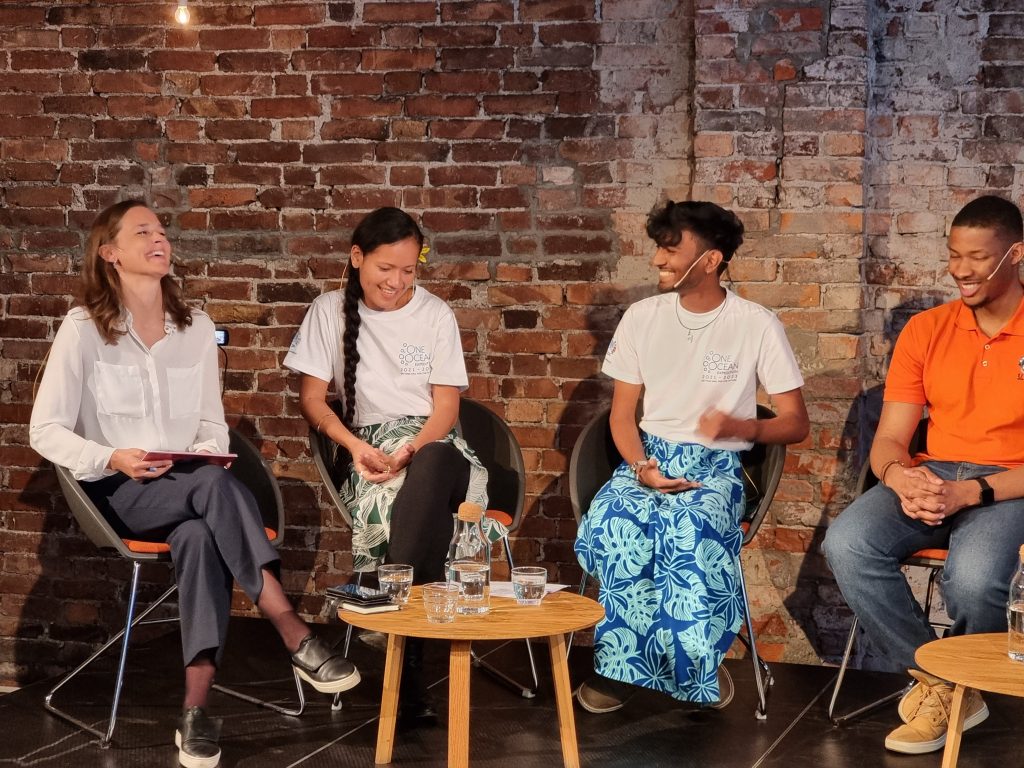
Panel discussion during Climate Narratives’ youth event. Camilla Borrevik (left), Bernadette Tunidau, Ozayr Akbar and Deron Maitland. Photo: Håkon Larsen
The presence of our USP delegation seem to have made a striking impact in Bergen during One Ocean Week. This was drawn particular attention to in an article published by Khrono (a prominent online news hub on higher education and research in Norway) in which Bernadette Tunidau was interviewed about issues of sea-level rise in the Pacific and the value and importance of traditional knowledge to pluralize science perspectives. As Bernadette so clearly stated in this interview (printed originally in Norwegian); “we need to find new ways of communicating and to collaborate, and I think the connection between art and culture with research and science can take us in the right direction.” Bernadette’s comments were made to address the fact that Pacific Islanders have a tremendous amount of intergenerationally accumulated knowledge about their lived environments: knowledge which should be highly important for people to be aware of when dealing with ocean and climate related issues.
Making connections between arts and climate science was also a central part of the Ocean Stories art exhibition at KODE that opened at the beginning of One Ocean Week, featuring art from both Fiji and Greenland. The exhibition was curated by Eamon O’Kane (UiB) with partners from Norway, Greenland and Fiji. Eamon directs the artistic component of the Climate Narratives project, in which Edvard Hviding is a Professor II. Original works of art brought in from Fiji were displayed in a large section of the ‘Lysverket Gallery’ (KODE 4), curated by Larry Thomas from the USP’s Oceania Centre who collaborated closely with Eamon and Edvard on an intensive creative workshop with Fijian artists in Suva last year while Statsraad Lehmkuhl was in the vicinity.
Besides these central events of One Ocean Week, OceanStates members and the USP delegation also participated in a wide array of other events, seminars and conferences throughout the week: following presentations and debates on issues like deep-sea mining, the green/blue transition, fisheries and climate change. Several of us were also delegates in the official programme of One Ocean Week, including receptions and even dinner with the King of Norway onboard Statsraad Lehmkuhl.
To round off the visit to Norway, parts of the USP delegation travelled to Oslo to meet with representatives from the Ministry of Foreign Affairs and the Norwegian Agency for Development Cooperation to discuss collaboration on research and higher education, in particular the current implementation phase of the Norway-Pacific Ocean-Climate Scholarship Programme (N-POC) which Edvard Hviding coordinates.

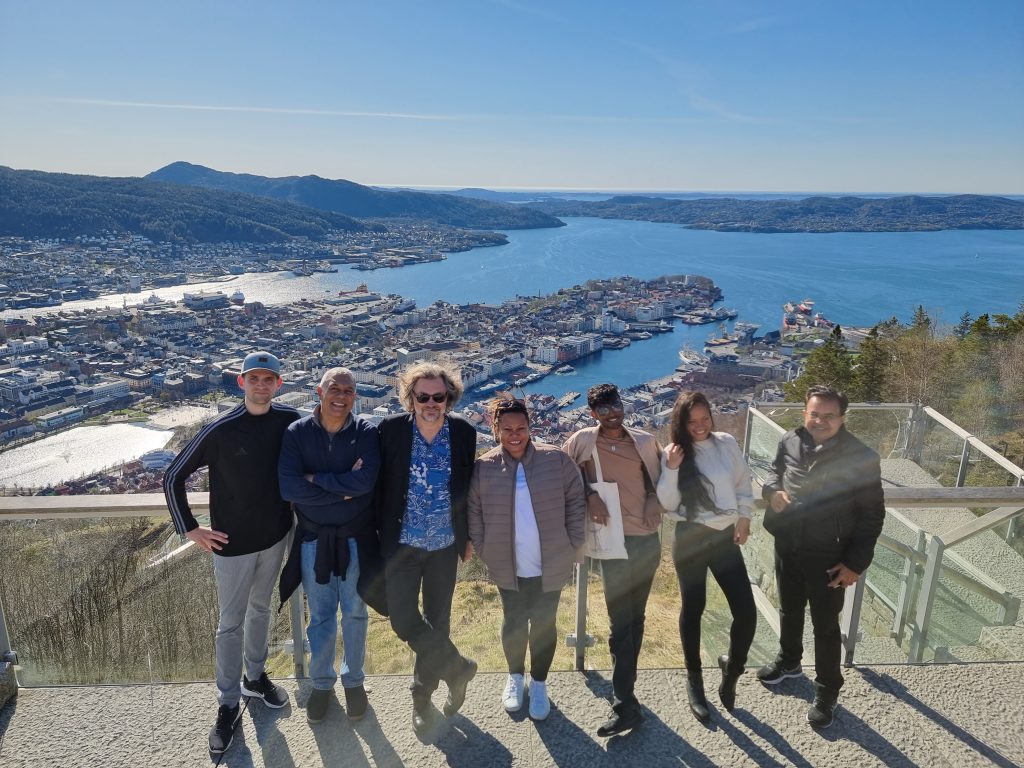
Håkon Larsen (left), Larry Thomas, Edvard Hviding, Lillian Fuata, Ozayr Akbar, Bernadette Tunidau and Sushil Kumar on top of Mount Fløyen in Bergen.
The Island Lives, Ocean States project wishes to thank all our colleagues and friends from USP and Fiji who made such tremendous impact in shaping One Ocean Week. Thank you for taking your time to be here with us and for enriching and diversifying all the conversations that you took part in about ocean, climate, and sustainability during your stay here in Bergen. Vinaka vakalevu.
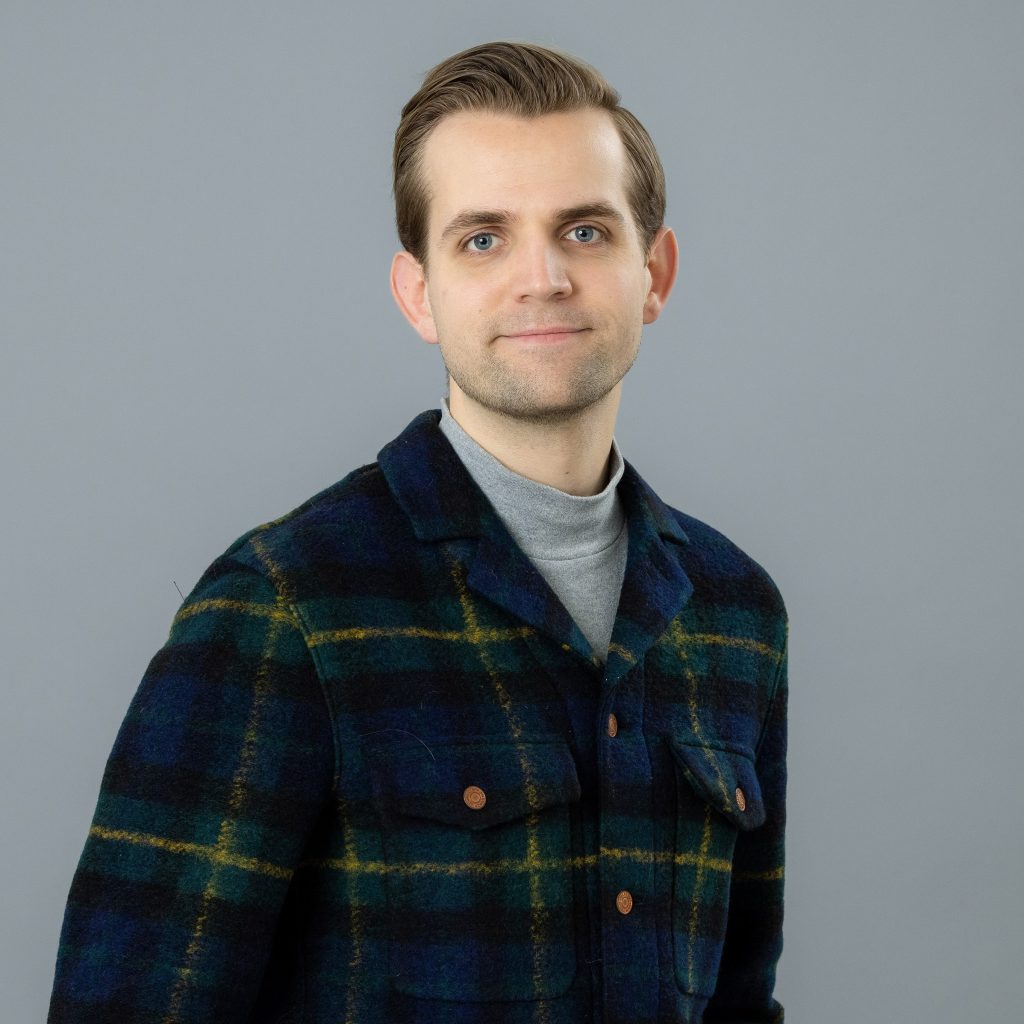 Håkon Larsen is a social anthropologist who works as a research assistant at the University of Bergen. With fieldwork experience from Fiji, his interest of research has focused on the socioenvironmental aspects of spearfishing, rural development, and subsistence economics in the island group of Lau. Today, Larsen is also working on the issue of deep-sea mining in the Pacific region and beyond. He currently works with website and blog management, communication, and administration on the Island Lives, Ocean States project.
Håkon Larsen is a social anthropologist who works as a research assistant at the University of Bergen. With fieldwork experience from Fiji, his interest of research has focused on the socioenvironmental aspects of spearfishing, rural development, and subsistence economics in the island group of Lau. Today, Larsen is also working on the issue of deep-sea mining in the Pacific region and beyond. He currently works with website and blog management, communication, and administration on the Island Lives, Ocean States project.